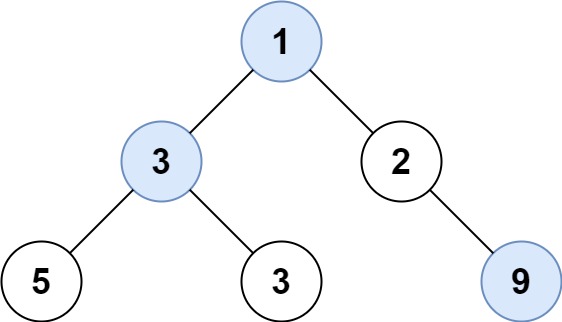Problem
Given the root of a binary tree, return an array of the largest value in each row of the tree (0-indexed).
Example 1:

Input: root = [1,3,2,5,3,null,9]
Output: [1,3,9]
Example 2:
Input: root = [1,2,3]
Output: [1,3]
Constraints:
The number of nodes in the tree will be in the range
[0, 10^4].-2^31 <= Node.val <= 2^31 - 1
Solution (Java)
/**
* Definition for a binary tree node.
* public class TreeNode {
* int val;
* TreeNode left;
* TreeNode right;
* TreeNode() {}
* TreeNode(int val) { this.val = val; }
* TreeNode(int val, TreeNode left, TreeNode right) {
* this.val = val;
* this.left = left;
* this.right = right;
* }
* }
*/
class Solution {
public List<Integer> largestValues(TreeNode root) {
List<Integer> list = new ArrayList<>();
Queue<TreeNode> queue = new LinkedList<>();
if (root != null) {
queue.offer(root);
while (!queue.isEmpty()) {
int max = Integer.MIN_VALUE;
int size = queue.size();
for (int i = 0; i < size; i++) {
TreeNode curr = queue.poll();
max = Math.max(max, curr.val);
if (curr.left != null) {
queue.offer(curr.left);
}
if (curr.right != null) {
queue.offer(curr.right);
}
}
list.add(max);
}
}
return list;
}
}
Explain:
nope.
Complexity:
- Time complexity : O(n).
- Space complexity : O(n).